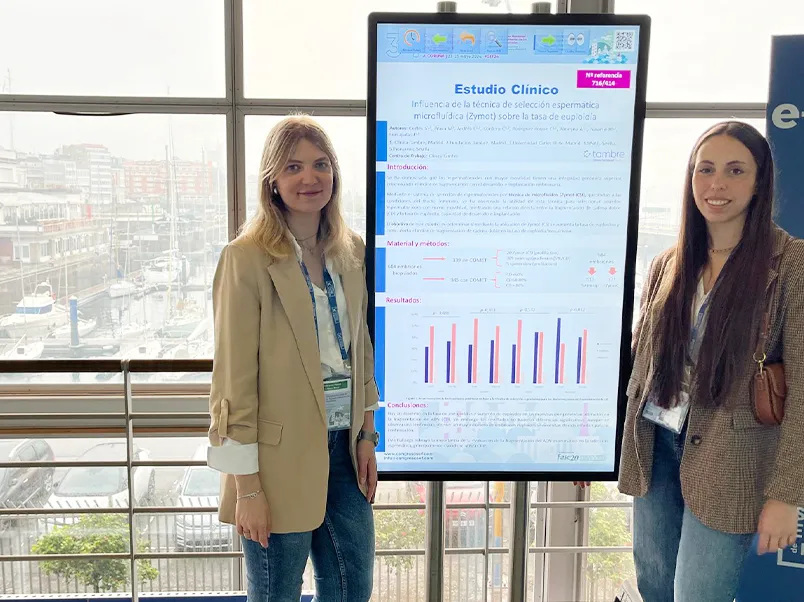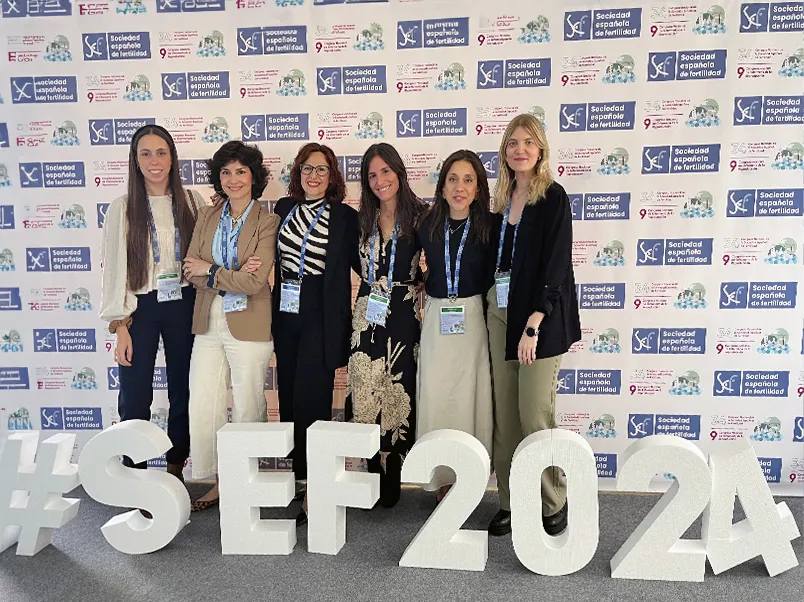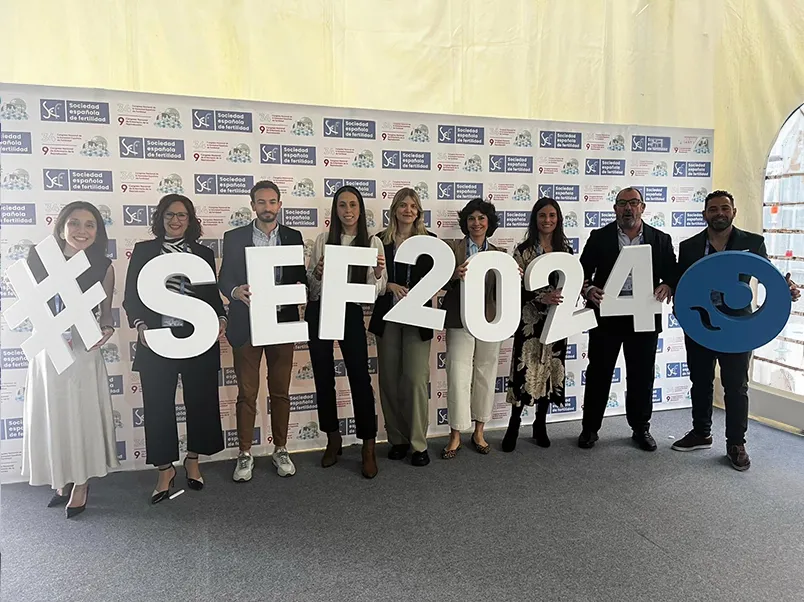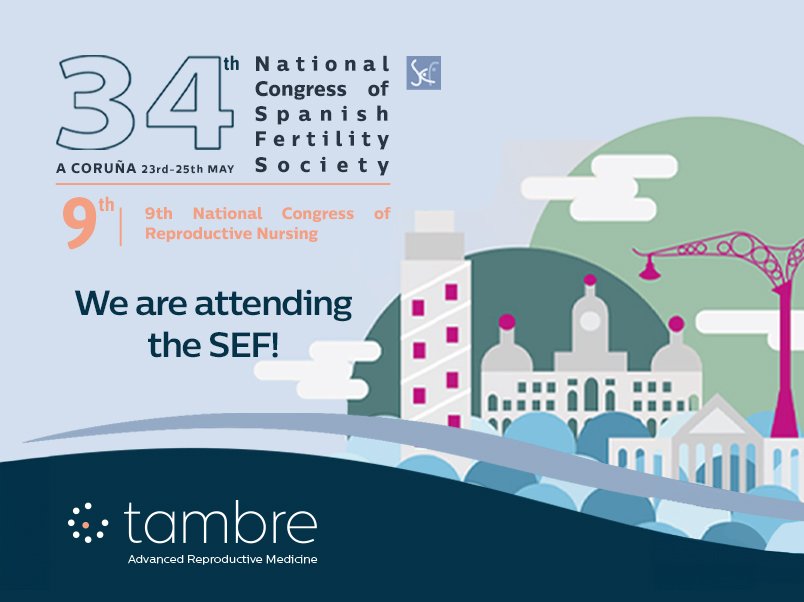Table of contents
Tambre science at SEF 2024
Genetic studies, treatment for egg donors and a study on the selection of spermatozoa are the research areas which Clinica Tambre are presenting at the 34th SEF Congress.

Tambre biologists Carmen Rodriguez and Marta Manzanares
Members of the Tambre team are in A Coruña this week, where they are participating in the 34th Congress of the Spanish Fertility Society (SEF), which takes place from Thursday 23rd to Saturday 25th May. At the SEF Congress, which takes place every two years, we will be sharing five research projects developed at our clinic in the last two years.with the scientific community.
In addition to being a meeting place for specialists, gynaecologists, embryologists, nurses and scientists, it is a must-attend event to learn about the latest advances in Reproductive Medicine. These developments are aimed at making it easier for fertility specialists to practice their profession in order to find more effective and faster solutions that allow patients to access the latest fertility treatments.
This year, the Tambre Clinic will be presenting five research projects in the areas of nursing, gynaecology and embryology. These papers, presented in poster format, demonstrate Tambre’s commitment to research and the efforts of its professionals to provide knowledge on the development of new procedures in genetics, as well as in the management and treatment of egg donors; laboratory studies on sperm selection and its relationship with embryo quality.
The event was attended by representatives from the Madrid clinic. From the medical team, doctors Paloma Sánchez-Gómez, Estefanía Moreno and Sofía Fabra; from the IVF laboratory, embryologists Carmen Rodríguez and Marta Manzanares; Marta Ruano from the nursing department, and Tambre’s scientific advisor, José Horcajadas.

Part of the Tambre team that attended SEF 2024.
Tambre’s fertility psychologist, Raquel Urteaga, a member of the Standing Committee of the SEF Psychology Interest Group, is leading a scientific study together with psychology professionals from other centres, focusing on the mental wellbeing of fertility nurses. She is also offering a workshop for nurses during the congress.
Stimulation
In the fertility process, ovarian stimulation to obtain eggs is a vital step. The study we have carried out in our egg donor programme reveals that it is possible to reduce the number of injections from daily to weekly. This way, in addition to convenience, it is possible to space out the visits to the clinic. This research is an example of our efforts to improve our treatments and improve patient wellbeing. Tambre’s scientific director, Dr. Ángela Llaneza, is the main author of this study.
Vitrifying oocytes
The specialist presents another highly interesting piece of research, which is the finding that there has been an increase in the number of women who decide to freeze their eggs in order to decide on motherhood at a later date. At Tambre we have found that in addition to vitrifying their oocytes, women are doing so at an earlier age, an average age of 35, and that many women from other countries care choosing to come to Spain for reasons of preservation, according to the conclusion of the study led by Dr. Llaneza.
Double trigger
Another research project headed by Tambre’s fertility expert gynaecologist, Paloma Sánchez-Gómez, evaluates the results of the double trigger; the double medication for the final maturation of oocytes. The results are promising, as they improve both egg retrieval and the rate of mature oocytes, with safety and good tolerance for donors.
Data sequencing
Genetic studies are also part of our research and interests. We know that 1 in 40 couples is at risk of having a child affected by a genetic disease. Big data sequencing helps us to identify mutations and genetic diseases and prevent reproductive risk. One of the papers presented at the SEF 2024 congress analyses the results of more than 1,300 patients and donors who underwent genetic testing. The results of this study developed in the field of nursing are presented by Marta Ruano, a nurse at Tambre.
Select the best spermatozoa
The fifth and final paper that we are presenting at the SEF Congress has been developed in the Andrology laboratory. We start from the premise that techniques to select the best spermatozoa help professionals to improve success rates. Tambre’s laboratory director, Susana Cortés, who is leading the study, explains the influence of the Zymot microfluidic selection technique in her study and has found that it achieves a greater number of chromosomally normal embryos in patients with alterations in their sperm.
The congress involves a large number of Spanish and international based assisted reproduction professionals and represents Spain’s continued focus on scientific development and patient care and support.


